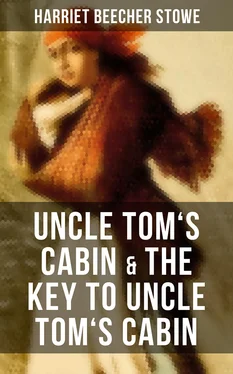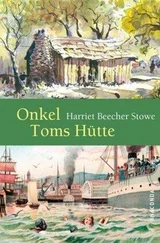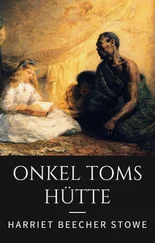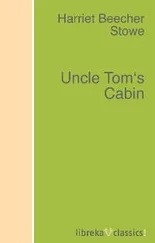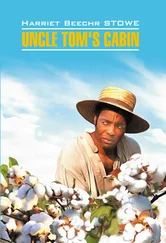"That troubles me, Augustine. I can't help feeling as if these servants were not strictly honest. Are you sure they can be relied on?"
Augustine laughed immoderately at the grave and anxious face with which Miss Ophelia propounded the question.
"O, cousin, that's too good,—honest!—as if that's a thing to be expected! Honest!—why, of course, they arn't. Why should they be? What upon earth is to make them so?"
"Why don't you instruct?"
"Instruct! O, fiddlestick! What instructing do you think I should do? I look like it! As to Marie, she has spirit enough, to be sure, to kill off a whole plantation, if I'd let her manage; but she wouldn't get the cheatery out of them."
"Are there no honest ones?"
"Well, now and then one, whom Nature makes so impracticably simple, truthful and faithful, that the worst possible influence can't destroy it. But, you see, from the mother's breast the colored child feels and sees that there are none but underhand ways open to it. It can get along no other way with its parents, its mistress, its young master and missie play-fellows. Cunning and deception become necessary, inevitable habits. It isn't fair to expect anything else of him. He ought not to be punished for it. As to honesty, the slave is kept in that dependent, semi-childish state, that there is no making him realize the rights of property, or feel that his master's goods are not his own, if he can get them. For my part, I don't see how they can be honest. Such a fellow as Tom, here, is,—is a moral miracle!"
"And what becomes of their souls?" said Miss Ophelia.
"That isn't my affair, as I know of," said St. Clare; "I am only dealing in facts of the present life. The fact is, that the whole race are pretty generally understood to be turned over to the devil, for our benefit, in this world, however it may turn out in another!"
"This is perfectly horrible!" said Miss Ophelia; "you ought to be ashamed of yourselves!"
"I don't know as I am. We are in pretty good company, for all that," said St. Clare, "as people in the broad road generally are. Look at the high and the low, all the world over, and it's the same story,—the lower class used up, body, soul and spirit, for the good of the upper. It is so in England; it is so everywhere; and yet all Christendom stands aghast, with virtuous indignation, because we do the thing in a little different shape from what they do it."
"It isn't so in Vermont."
"Ah, well, in New England, and in the free States, you have the better of us, I grant. But there's the bell; so, Cousin, let us for a while lay aside our sectional prejudices, and come out to dinner."
As Miss Ophelia was in the kitchen in the latter part of the afternoon, some of the sable children called out, "La, sakes! thar's Prue a coming, grunting along like she allers does."
A tall, bony colored woman now entered the kitchen, bearing on her head a basket of rusks and hot rolls.
"Ho, Prue! you've come," said Dinah.
Prue had a peculiar scowling expression of countenance, and a sullen, grumbling voice. She set down her basket, squatted herself down, and resting her elbows on her knees said,
"O Lord! I wish't I 's dead!"
"Why do you wish you were dead?" said Miss Ophelia.
"I'd be out o' my misery," said the woman, gruffly, without taking her eyes from the floor.
"What need you getting drunk, then, and cutting up, Prue?" said a spruce quadroon chambermaid, dangling, as she spoke, a pair of coral ear-drops.
The woman looked at her with a sour surly glance.
"Maybe you'll come to it, one of these yer days. I'd be glad to see you, I would; then you'll be glad of a drop, like me, to forget your misery."
"Come, Prue," said Dinah, "let's look at your rusks. Here's Missis will pay for them."
Miss Ophelia took out a couple of dozen.
"Thar's some tickets in that ar old cracked jug on the top shelf," said Dinah. "You, Jake, climb up and get it down."
"Tickets,—what are they for?" said Miss Ophelia.
"We buy tickets of her Mas'r, and she gives us bread for 'em."
"And they counts my money and tickets, when I gets home, to see if I 's got the change; and if I han't, they half kills me."
"And serves you right," said Jane, the pert chambermaid, "if you will take their money to get drunk on. That's what she does, Missis."
"And that's what I will do,—I can't live no other ways,—drink and forget my misery."
"You are very wicked and very foolish," said Miss Ophelia, "to steal your master's money to make yourself a brute with."
"It's mighty likely, Missis; but I will do it,—yes, I will. O Lord! I wish I 's dead, I do,—I wish I 's dead, and out of my misery!" and slowly and stiffly the old creature rose, and got her basket on her head again; but before she went out, she looked at the quadroon girt, who still stood playing with her ear-drops.
"Ye think ye're mighty fine with them ar, a frolickin' and a tossin' your head, and a lookin' down on everybody. Well, never mind,—you may live to be a poor, old, cut-up crittur, like me. Hope to the Lord ye will, I do; then see if ye won't drink,—drink,—drink,—yerself into torment; and sarve ye right, too—ugh!" and, with a malignant howl, the woman left the room.
"Disgusting old beast!" said Adolph, who was getting his master's shaving-water. "If I was her master, I'd cut her up worse than she is."
"Ye couldn't do that ar, no ways," said Dinah. "Her back's a far sight now,—she can't never get a dress together over it."
"I think such low creatures ought not to be allowed to go round to genteel families," said Miss Jane. "What do you think, Mr. St. Clare?" she said, coquettishly tossing her head at Adolph.
It must be observed that, among other appropriations from his master's stock, Adolph was in the habit of adopting his name and address; and that the style under which he moved, among the colored circles of New Orleans, was that of Mr. St. Clare.
"I'm certainly of your opinion, Miss Benoir," said Adolph.
Benoir was the name of Marie St. Clare's family, and Jane was one of her servants.
"Pray, Miss Benoir, may I be allowed to ask if those drops are for the ball, tomorrow night? They are certainly bewitching!"
"I wonder, now, Mr. St. Clare, what the impudence of you men will come to!" said Jane, tossing her pretty head 'til the ear-drops twinkled again. "I shan't dance with you for a whole evening, if you go to asking me any more questions."
"O, you couldn't be so cruel, now! I was just dying to know whether you would appear in your pink tarletane," said Adolph.
"What is it?" said Rosa, a bright, piquant little quadroon who came skipping down stairs at this moment.
"Why, Mr. St. Clare's so impudent!"
"On my honor," said Adolph, "I'll leave it to Miss Rosa now."
"I know he's always a saucy creature," said Rosa, poising herself on one of her little feet, and looking maliciously at Adolph. "He's always getting me so angry with him."
"O! ladies, ladies, you will certainly break my heart, between you," said Adolph. "I shall be found dead in my bed, some morning, and you'll have it to answer for."
"Do hear the horrid creature talk!" said both ladies, laughing immoderately.
"Come,—clar out, you! I can't have you cluttering up the kitchen," said Dinah; "in my way, foolin' round here."
"Aunt Dinah's glum, because she can't go to the ball," said Rosa.
"Don't want none o' your light-colored balls," said Dinah; "cuttin' round, makin' b'lieve you's white folks. Arter all, you's niggers, much as I am."
"Aunt Dinah greases her wool stiff, every day, to make it lie straight," said Jane.
"And it will be wool, after all," said Rosa, maliciously shaking down her long, silky curls.
"Well, in the Lord's sight, an't wool as good as bar, any time?" said Dinah. "I'd like to have Missis say which is worth the most,—a couple such as you, or one like me. Get out wid ye, ye trumpery,—I won't have ye round!"
Читать дальше
